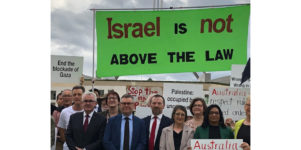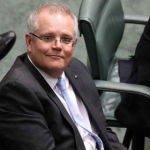Australia Moves to Block an Investigation into War Crimes in Palestine

On Wednesday, Israeli president Reuven Rivlin paid a visit to Australian parliament in Canberra. And to greet him was a vigil for Palestinian human rights, which involved a number of federal parliamentarians, including Andrew Wilkie, Mehreen Faruqi and Adam Bandt.
Hosted by APAN – Australia Palestine Advocacy Network, the action was protesting the decision of the Morrison government to officially contest an investigation by the International Criminal Court (ICC) into war crimes perpetrated in Palestine.
ICC prosecutor Fatou Bensouda announced in December that her preliminary inquiry into the situation in Palestine found all statutory criteria had been met for the case to proceed. However, she put her findings to review due to the “unique” situation of the occupied Palestinian territories.
Australia’s objection was put to the court after hard lobbying from Israel, which, along with the US, is not a party to the ICC. This country was one of only six nations to advise the court as to its contention to the war crimes inquiry.
And while one might question why our government wants to deter an investigation into war crimes perpetrated on both sides – which the prosecutor has established happened based on prima facie evidence – you only have to look at Canberra’s bipartisan pro-Israel track record to see why.
Beyond reproach
“Australia’s efforts to block an International Criminal Court investigation into alleged war crimes in Palestine are inexplicable,” said APAN president Bishop George Browning. And he explained that this was especially so as the “brief to investigate abuses from all sources”, includes Palestinian groups.
“This intervention takes Australia’s growing, one-sided, support of Israel to a new high,” he told Sydney Criminal Lawyers.
The Rome Statute is the treaty that established the ICC in 2002. As Bishop Browning pointed out Australia ratified the statute that same year. And since that time, he’s observed that this nation has supported many investigations that the international court has undertaken.
The long-term advocate for Palestinian rights further makes clear that the Morrison government’s objection to the inquiry raises questions around why Palestinians are unable to seek legal recourse relating to abuses, and that Israel shouldn’t be held accountable over war crimes.
“No Australian interest is served by taking such a partisan position on the issue of Palestinian human rights,” Bishop Browning continued. “This intervention by the Australian government is promoting a culture of Israeli impunity.”
Just itching to submit
The Australian amicus brief states that “Australia does not recognise the ‘State of Palestine’ and does not have any relationship with the ‘State of Palestine’ under the Rome Statute.” The nation adds that it can provide further observations as to why to the ICC.
The document then goes onto to explain that the observations would address Palestine’s “purported accession” to party status to the Rome Statute, as well as the prosecutor’s arguments in that regard. And it then requests leave to submit these written observations.
As the Australian Centre for International Justice outlined Palestine became a state party to the Rome Statute in January 2015. And this followed it’s upgrading to observer status by the UN General Assembly in November 2012, “affirming its status as a State”.
ACIJ director Rawan Arraf said in a statement that the “unprecedented” position of the Australian government undermines its “commitment to uphold and promote accountability and international justice on the global stage”.
“Why is Australia going out of its way to hold back an investigation into Palestine?” she asked.
A prima facie case
As noted in the Guardian, the full report on the preliminary investigation into Palestine sets out that there’s evidence pointing to at least three incidents during the 2014 Gaza war that suggest crimes were committed by Israeli forces.
The inquiry more specifically pointed to alleged war crimes committed “in relation to the transfer of Israeli civilians into the West Bank since 13 June 2014”. And there’s also scope to look into alleged crimes perpetrated at the Great March of Return rally in Gaza that began in March 2018.
The document further states that there’s evidence to support claims of war crimes committed by “Hamas and Palestinian armed groups”, which were purportedly carried out intentionally against civilian targets.
Unbridled support
On 14 May 2018, Israeli forces opened fire on the Great March of Return demonstration at the Gaza-Israel border, killing 58 unarmed Palestinian protesters. While just 70 kilometres away, president Donald Trump’s daughter, Ivanka, was opening the newly-moved US embassy in Jerusalem.
Following the massacre, Australia was one of only two nations at a special meeting of the UN Human Rights Council that voted against an independent investigation into the slaughter. Our nation stated that it understood “Israel had legitimate security concerns”.
The second nation was the United States. Renowned political commentator Noam Chomsky posits that the reason the US, Australia and Canada have been Israel’s most consistent supporters is that all four nations are of settler-colonial origins, which makes them natural allies.
Diplomacy in a wet paper bag
Under the Morrison government, Australia’s support has only been intensifying. In October 2018, the newly-minted prime minister announced he was considering moving the nation’s embassy to Jerusalem and recognise the city as the capital of Israel.
The Trumpian move by Morrison – which he ultimately reneged on – was widely seen as a political manoeuvre to garnish support for the Liberal candidate in the Wentworth byelection. The ploy failed, as independent Dr Kerryn Phelps took the seat.
However, what the prime minister’s announcement showed was a blatant disregard for an oppressed people and the violence that his decision could result in, especially in light of what occurred after his American counterpart publicly divulged his decision.
And sticking to the point regarding destructive consequences, Bishop Browning said the current decision of our government “encourages and promotes the most extreme elements” of Israeli society to continue with their prejudice, making “any proposition for peace” a “most forlorn hope”.







